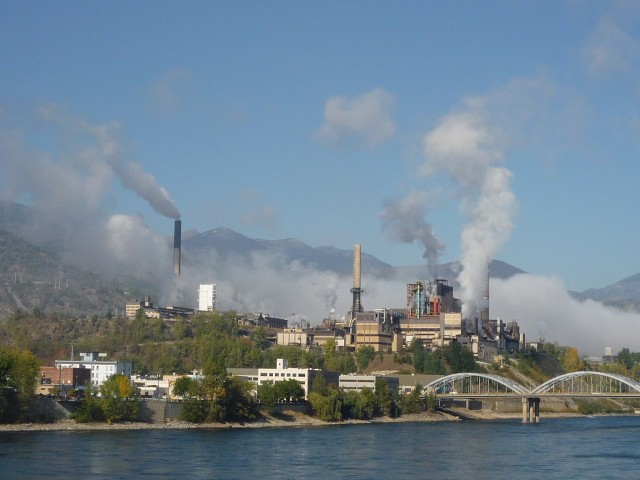Shutting It Down: Teck to perform maintenance and inspections on its lead smelter and zinc roaster
On Friday October 15 until Monday November 15, Teck Operations in Trail will be shutting down its lead smelter for maintenance projects, and from October 18 – 31 it will be shutting down its zinc roaster area, also for maintenance. The total cost of both projects will be $45 million in total, with $39 million being spent on the lead smelter projects and $6 million being spent on the zinc roaster projects. Also going on during the shutdown will be complete Safety and Hygiene planning and auditing, at a cost of $4 million.
According to a document released to local media during a presentation and tour of the lead smelter on Monday, the breakdown of projects and costs for the work on the lead smelting operation look like this.
- KIVCET boiler (boiler cleaning, inspection and tube repair) $13.5 million
- KIVCET furnace (replacement of copper cooling jackets and furnace rebricking): $12.6 million
- Continuous Drossing Furnace (replacement of copper cooling jackets and furnace rebricking): $4.3 million
- No.3 Slag Fuming Furnace and Slag Granulation System (replacement of 2000 horsepower motor that provides blast air; boiler inspection; replacement of steel cooling jackets): $2 million
- Gas Handling System (repair of brickwork and rubber membrane liner in spray tower; maintenance work on the gas handling flue): $1.7 million
For the zinc roaster, routine maintenance will be carried out during the lead smelter shutdown to take advantage of the Gas Handling System being down (gas from the lead smelting process goes on to the zinc roaster to be made into sellable products like sulphuric acid and liquid sulphur dioxide).
The lead smelter projects will see an additional 650 contract employees on site, and the zinc roaster projects will involve another 135 contract employees. About one quarter of this contract workforce will be composed of local labourers. Some of the contractors involved are West Kootenay Mechanical (WKM) from Trail and Canadian Industrial Mill Services (CIMS) from Richmond.
The planning for this shutdown began a year ago, but the previous shutdown, in 2007, provided much-needed information that informed the plan for this upcoming set of projects, and this 2010 shutdown will again provide information for a future shutdown, possibly in another three years.
Dale Webb, the Operating Manager of the lead smelter, says, “What we learn from this shutdown will dictate what we do the next shutdown. We have a very detailed quality plan to inspect pretty much every aspect of the whole smelter area…to get a better feel for what our planning will be three years from now. A lot of the work we did last shutdown we’re not actually doing any major work on [this time]. So some of the major pieces of equipment we did some major repairs on [in 2007], we’re not spending a lot of money on them.”
Additionally, in the 2007 shutdown, repairs in the KIVCET furnace and the Continuous Drossing Furnace done at that time indicated that the copper jackets and boiler work would need be seen to during this shutdown.
The other large aspect of the upcoming shutdown is Safety and Hygiene planning and auditing. Again, previous shutdowns inform future shutdowns when it comes to health and safety practices and protocols.
“In 2001, we had a hygiene-related issue with regards to thallium, from work inside the boiler,” says Richard Deane, Manager of Energy and Public Affairs. “We learned a tremendous amount from that shutdown which informed future shutdowns. Every shutdown, from the information we collect through monitoring equipment we put in place and biological monitoring that’s done, and the safety procedures that are put in place, we are able to learn and improve. We were quite happy with the results of the 2007 shutdown, and we have put a tremendous amount of planning into this shutdown in terms of safety and health.”
Part of the $4 million set aside for safety and hygiene management during the lead smelter shutdown includes $900,000 in additional safety equipment, such as Powered Air Purifying Respirators (PAPRs) that reduce airborne contaminants by 1000 times. These are mainly used for those employees and contractors who will potentially come into contact with thallium in the boiler.
There will also be additional decontamination centres and cleaning facilities for respiratory equipment, and Teck is expected to perform about 18,000 respirator cleanings during the shutdown period. Biological monitoring, including blood and urine testing, for lead, mercury, and thallium levels, will be carried out depending upon where a particular person is working, and for how long. Workplace sampling will also be conducted to in various work areas, and in past shutdowns over 700 personal samples have helped Teck determine base levels of personal protective equipment.
During this shutdown, there will be a 15 full time members of a Safety Management Team comprised of five Teck Health and Safety representatives, including one Safety Co-ordinator from USW Local 480. Both WKM and CIMS will be providing five safety staff each, and Teck will regularly conduct audits to make sure that job plans are followed.
























